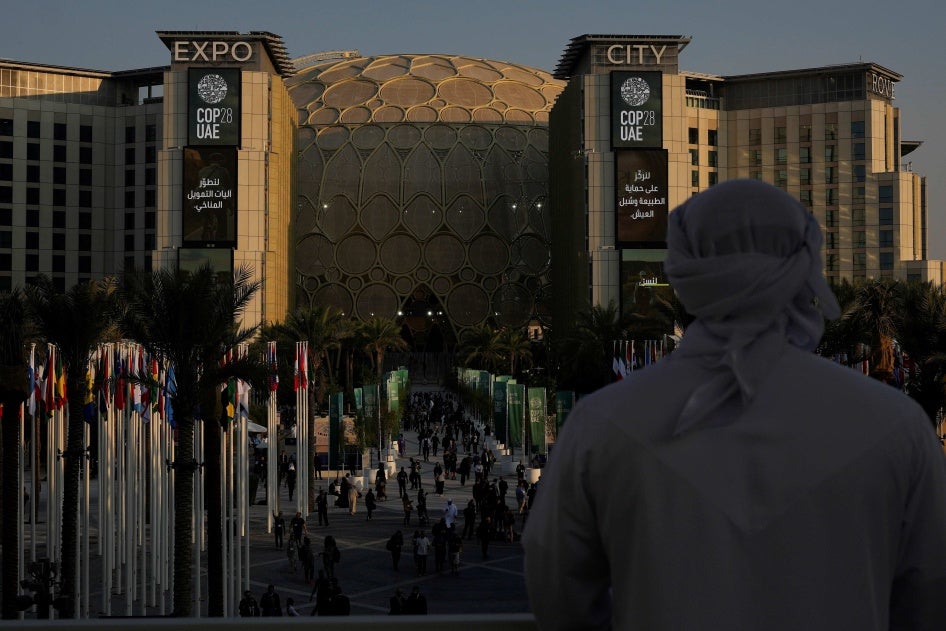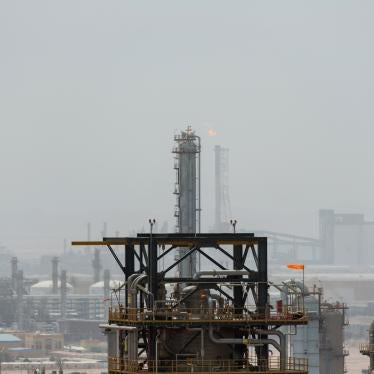(Beirut) – The United Arab Emirates (UAE) hosted the United Nations Climate Change Conference (COP28) in 2023 and used it to burnish its image despite pushing for fossil fuel expansion and maintaining a zero-tolerance policy toward dissent, Human Rights Watch said today in its World Report 2024.
The UAE, one of the world’s largest oil producers and per capita greenhouse gas emitters, hosted COP28 in November and December 2023 despite the country’s draconian repression of peaceful dissent, laws that prohibit free association and assembly and deny the right to privacy, and unjust imprisonment of scores of human rights defenders, activists, academics, and lawyers. The UAE’s closure of civic space limited meaningful participation of activists in climate negotiations. The COP28 acknowledged the need to transition away from fossil fuels, but fell short of a clear and time-bound commitment to phase out fossil fuels as the main drivers of the climate crisis.
“The UAE tried using COP28 to improve its image internationally to conceal the government’s deeply repressive policies and push to expand its fossil fuel production” said Joey Shea, UAE and Saudi Arabia researcher at Human Rights Watch. “This undermines global efforts to confront the climate crisis and protect human rights.”
In the 740-page World Report 2024, its 34th edition, Human Rights Watch reviews human rights practices in more than 100 countries. In her introductory essay, Executive Director Tirana Hassan says that 2023 was a consequential year not only for human rights suppression and wartime atrocities but also for selective government outrage and transactional diplomacy that carried profound costs for the rights of those not in on the deal. But she says there were also signs of hope, showing the possibility of a different path, and calls on governments to consistently uphold their human rights obligations.
The Emirati government’s sustained assault on rights and freedom over the last decade has led to the complete closure of civic space, severe restrictions of freedom of expression, both online and offline, and the criminalization of peaceful dissent. The UAE authorities deploy advanced surveillance technologies to monitor public space, internet activity, and people’s phones and computers.
The UAE’s cybercrimes law is used to silence dissidents, journalists, activists, and critics. Emirati authorities block and censor online content perceived to be critical. UAE law also criminalizes consensual nonmarital sex, “sodomy” with an adult male, and abortions under overly broad “morality offenses” that disproportionately affects women and lesbian, gay, bisexual and transgender (LGBT) people.
Personal status laws also discriminate against Emirati mothers, granting the father default guardianship of children. Emirati women remain unable to pass their nationality to their children on an equal basis with men.
While the UAE relies heavily on migrant workers, they experience serious labor abuses like wage theft, exorbitant recruitment fees, restrictions on job mobility, and passport confiscation. The UAE’s abusive kafala (visa sponsorship) system underpins these abuses as it ties migrant workers’ visas to their employers.
UAE-based migrant workers from climate-vulnerable countries like Nepal, Bangladesh, and Pakistan are exposed to escalating climate risks, especially when working in UAE’s extreme heat without adequate protection.
The UAE’s fossil fuel production and use contributes to toxic air pollution that creates major health risks for UAE citizens and residents and drives the global climate crisis.
As of March, Emirati authorities continued to hold at least 51 Emirati prisoners beyond their sentences on baseless counterterrorism justifications. These prisoners have been imprisoned as part of the grossly unfair “UAE94” mass trial of 69 government critics convicted on charges that violate their rights to free expression and association.
Ahmed Mansoor, UAE’s last Emirati human rights defender working publicly at the time of his arrest in March 2017, remains arbitrarily imprisoned for charges based on his human rights advocacy. Mansoor was sentenced by an Emirati state security court to 20 years in prison and a fine following more than a year in pretrial isolation detention and a grossly unfair trial.
In December 2023, the Emirati government brought new charges against 87 people, including Mansoor and UAE94 prisoners, under its counterterrorism law based on the establishment and support of the Justice and Dignity Committee, an independent advocacy group, in 2010. Informed sources and family members said that the defendants were held in incommunicado solitary confinement for at least 5 months and forced to sign documents confessing to committing “terrorist acts” ahead of the first hearing on December 7.
In May, UAE authorities successfully extradited an Emirati-Turkish citizen, Khalaf Abdul Rahman al-Romaithi, from Jordan. Al-Romaithi, whose family has not heard from nor know his whereabouts since May 9, is at serious risk of arbitrary detention, unfair trial, and possibly torture in the UAE.









